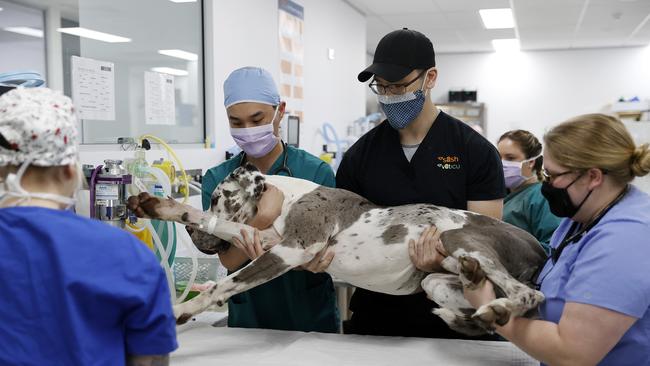Uni fee help solution to rural vet shortage
A growing shortage of vets in rural Australia has led to calls for the federal government to forgive HECS-HELP debts for veterinary graduates who live and work in regional areas.

A growing shortage of vets in rural Australia has led to calls for the federal government to forgive HECS-HELP debts for veterinary graduates who live and work in regional areas.
The scheme could work in tandem with programs waiving university fees for doctors, nurses and teachers who work in remote areas.
The call from the Australian Veterinary Association has been backed by the industry, which says the federal government needs to do more to entice graduates out of the cities.
Many vets graduate university with HECS debts of more than $80,000, but many are choosing to stay in metropolitan areas or head overseas.
Apiam managing director Chris Richards, whose organisation runs 74 clinics throughout the country, said there are not enough rural and regional vets as demand booms.
He backed the AVA’s call for a HECS forgiveness program but said it should focus on length requirements for it to work.
About 20 per cent of Apiam’s new graduate vets return home within the first two to three years of employment, in most cases to metropolitan areas.
New Zealand offers new graduates working in rural areas $55,000 over five years.
“We‘re calling on the government to do the same thing here,” Mr Richards said.
Mr Richards said the veterinary industry had been “caught out” by the population growth in rural areas and the increase in pets.
“We’ve had an increase in the pet care side in regional areas, as well as the standards of care that are expected.
“Agriculture industries are growing, and we’ve got more responsibilities around surveillance of emergency animal diseases and we’ve got a couple sitting on our doorstep with Foot and Mouth Disease and lumpy skin disease.
“I think everyone’s just been caught out in the demand in the regional areas. It’s grown significantly.”
Apiam offers scholarships to some veterinary students to gain hands-on experience in rural areas, but Mr Richards said more were needed.
“Those that do get out there … we tend to retain them because they get such a diversity around species, and what they do on a day-to-day basis, is a pretty exciting life,” he said.
A recent survey by the AVA found 100 per cent of respondents would consider working in a regional or rural practice if their HECS debt was wiped.
Gippsland vet Abigail Lyons moved from her home city of Perth to rural Victoria in 2021.
She said any incentives to lure vets into the regions would help city dwellers see the positive lifestyle that a country career could bring.
“With Covid and the migration of people from the city in that time, the demand for vets out here has increased,” Ms Lyons said.
She said the biggest challenge for someone from the city moving to a rural town was being away from the family support network.
“I can’t speak for all clinics, but my clinic is very supportive and there are so many opportunities to build networks out here as well,” she said.
“I think there’s a really good scope for work life balance out here.”
A spokesman for Education Minister Jason Clare said the government would consider expanding HELP debt reductions beyond doctors and nurses during a review in 2025.








To join the conversation, please log in. Don't have an account? Register
Join the conversation, you are commenting as Logout